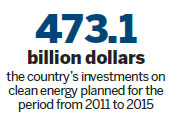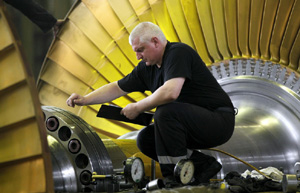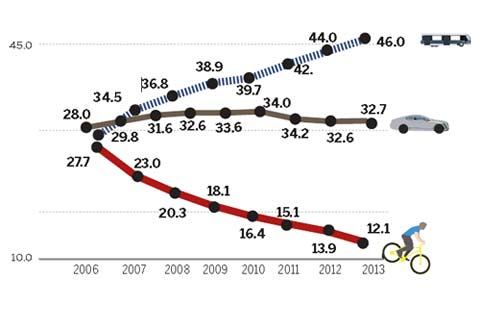Officials: Renewables need concerted efforts
Updated: 2014-09-20 08:06
By Lyu Chang(China Daily)
|
|||||||||||
|
 Dayawan nuclear plant in Shenzhen city, Guangdong province, on Aug 7, 2013. The Dayawan plant, equipped with two reactors, is China's first nuclear plant to be put into commercial use. [Photo / IC]
|
China, the world's largest carbon emitter, has an excellent opportunity to reform its energy policy by switching to renewables, but the entire process may take some time to achieve, top energy officials said on Friday.
Zhang Guobao, former chief of the National Energy Administration, the nation's top energy planner, said during the 4th Asian conference of International Association for Energy Economics in Beijing that the pressure from the economic slowdown and fluctuating oil prices may prompt the government to switch to renewables, with the nuclear sector playing a big role in the shift.
 China has set a target of having 15 percent of its energy from renewables by 2020, but the economic downturn makes it difficult for the nation to achieve that target, the former minister told China Daily.
China has set a target of having 15 percent of its energy from renewables by 2020, but the economic downturn makes it difficult for the nation to achieve that target, the former minister told China Daily.
"China will take at least half a century to complete that transition as a result of the economic downturn and technology breakthroughs," he said.
Gurkan Kumbaroglu, president of the Turkish Association for Energy Economics and vice-president of the IAEE, said it will not take that long to make the shift and with a sufficiently strong determination from policy-makers, China could reach its clean-energy targets much ahead of schedule.
The country's power consumption contracted for the first time this year in August, another sign of the economic slowdown. Electricity consumption dropped 1.5 percent year-on-year to 502 billion kWh last month, according to data from the NEA.
Fan Ying, director of the Center for Energy and Environmental Policy Research under the Chinese Academy of Sciences, said that nuclear power accounts for less than 2 percent of China's total electricity installations. "There is a lot of room for growth in that sector," she said.
According to Fan, the share of nuclear power is likely to rise to 4 percent in the coming years as China realizes that nuclear power generation can help reduce the reliance on coal-fired power.
"China should seize the moment to implement energy reforms and invest more on renewables and clean energy resources, whether it be technologies, or consolidation in the renewables sector," she said.
China has increased its investment in renewables nearly every year for the past decade with plans to spend $473.1 billion on clean energy investments from 2011 to 2015.
He Jiankun, director of the Low Carbon Energy Laboratory under Tsinghua University, said China has been trying to improve its energy efficiency and reduce green-house gas emissions, and its non-fossil energy supply more than doubled from 2005 to 2013. But "the shift will naturally bring about a decline in demand for energy-intensive raw materials such as iron, steel and cement," He said.
 |
 |
| 10 countries that have most nuclear power plants |
|
Related Stories
S Korea, US to hold nuclear energy talks 2014-09-17 17:13
US can untie the nuclear knot 2014-09-09 07:39
India, Australia finalize nuclear cooperation pact 2014-09-05 17:10
US, Iran to resume nuclear talks in Geneva 2014-09-04 14:57
Today's Top News
Scottish voters have rejected independence
Alibaba set to soar at $68 per share
Xi and Modi map out new era
Model filial son kept double life a secret
Parents of dead couple granted embryos
A rise in fallen stars
Thinnest-condom claims lead to lawsuit
US pledges diplomatic resolution of Ukraine crisis
Hot Topics
Lunar probe , China growth forecasts, Emission rules get tougher, China seen through 'colored lens', International board,
Editor's Picks

|

|

|

|

|

|





